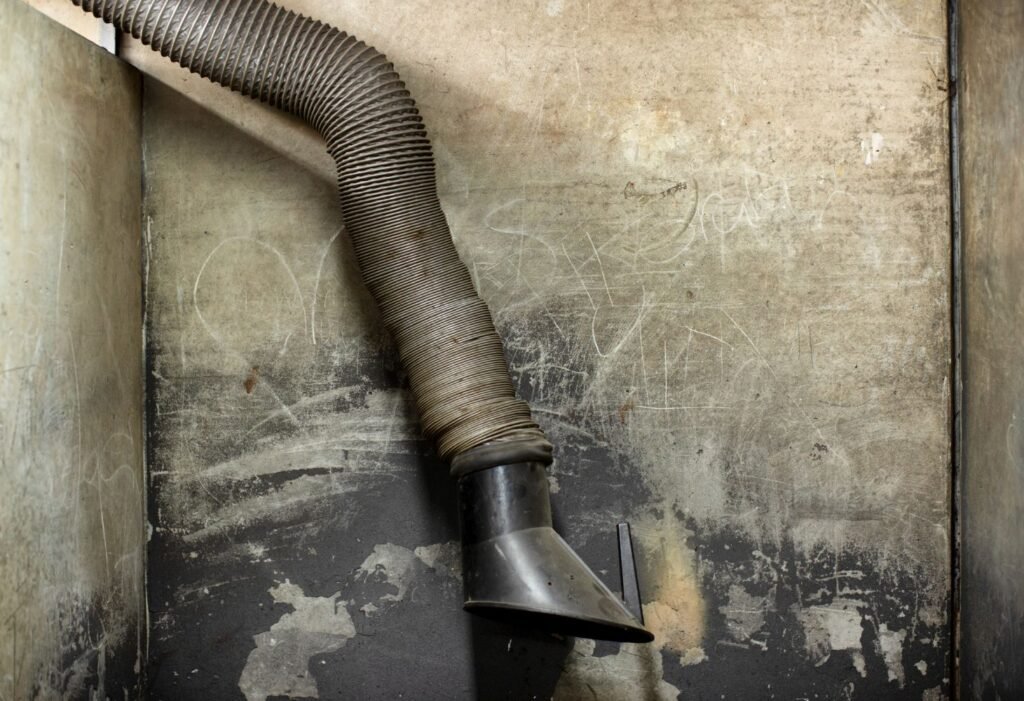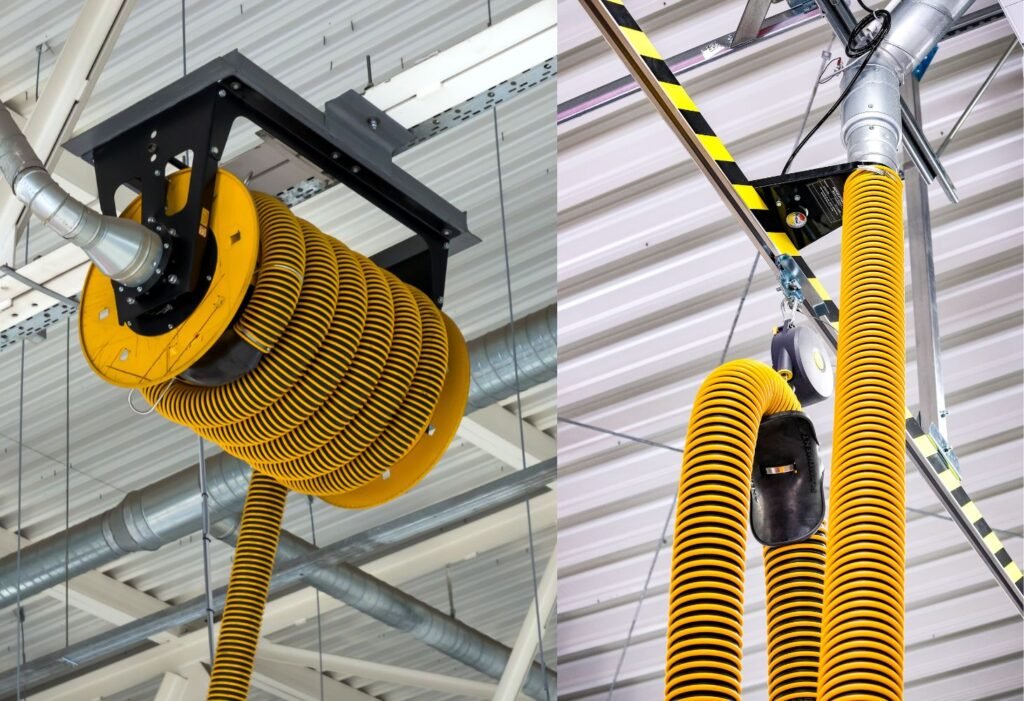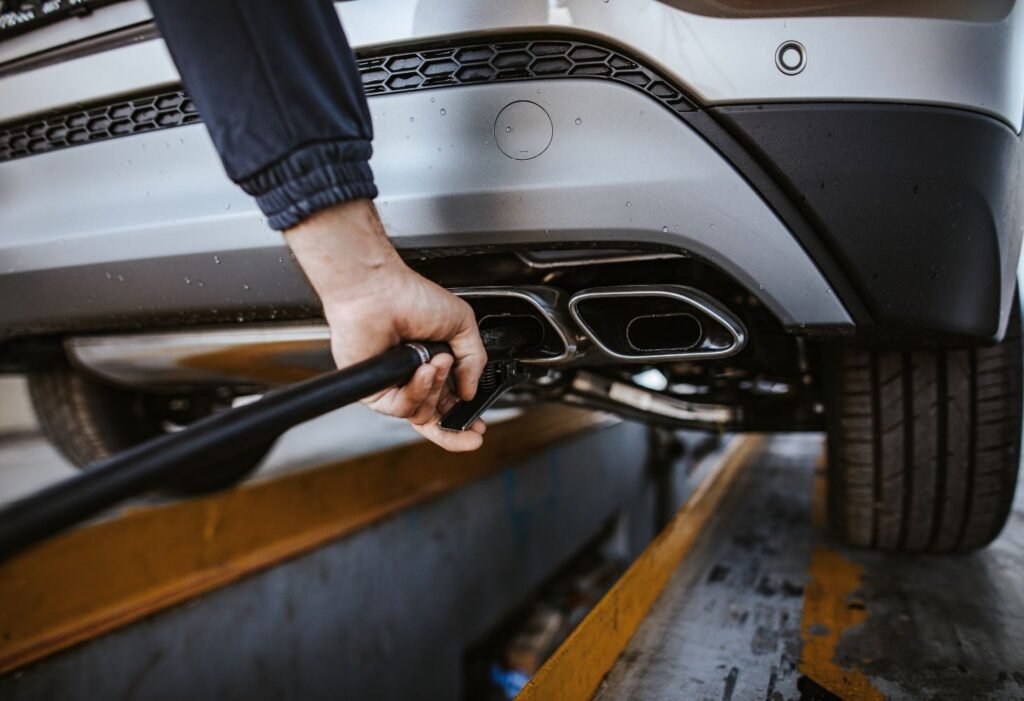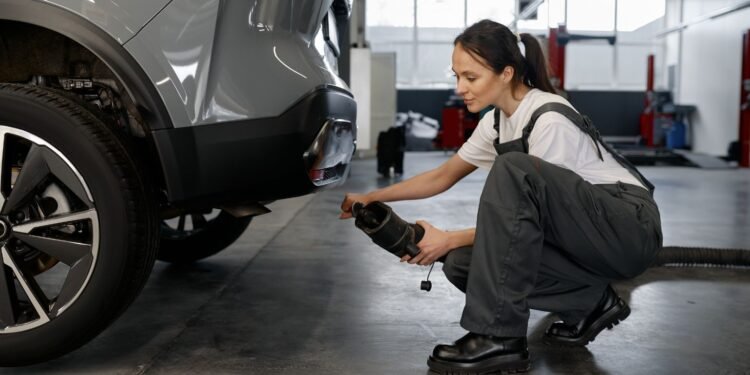If you’re a garage owner, DIY enthusiast, or automotive professional, the topic of garage exhaust hoses is likely to rev up your engine! Ensuring that car exhaust is properly vented out of your workspace is crucial for safety, health, and efficiency. Whether you’re a hobbyist working on your personal vehicle or a professional managing a bustling auto shop, the right exhaust hose can make all the difference. In this comprehensive guide, we’ll delve into various types of exhaust hoses—from homemade solutions to top-of-the-line products like Dayco hoses and necessary adapters. So, grab your tools, and let’s clear the air!
Homemade Exhaust Hose for Garage
Creating your own exhaust hose requires materials that can withstand high temperatures and direct exhaust output. Typical materials include high-temperature silicone hose or metal ducting, which are resilient against the heat and pressure of exhaust fumes.
Step-by-Step DIY Guide
- Measure the Exhaust Pipe: Start by measuring the diameter of your car’s exhaust pipe to ensure your hose will fit snugly.
- Select the Hose: Choose a hose that matches your exhaust pipe’s diameter and is rated for high temperatures.
- Attach the Hose: Secure the hose to the exhaust pipe using heat-resistant clamps to prevent any leaks.
- Vent to the Outside: Make sure the other end of the hose extends to an outdoor area to safely direct the exhaust out of your garage.
Always ensure the setup is air-tight and regularly inspect the hose for any signs of wear or damage. Avoid using flammable or melt-prone materials, and never leave the car running unattended with the DIY hose attached.
Dayco Garage Exhaust Hose

Features and Benefits of Dayco Hoses
Dayco hoses are renowned for their robust construction and reliability. Designed specifically for garage environments, these hoses are made from materials that can handle the heat and chemical composition of exhaust gases without degrading.
Ideal Use Cases and Durability
Perfect for both occasional DIY use and daily professional operations, Dayco hoses are built to last. They resist kinking and crushing, ensuring that exhaust flows freely without the risk of blockages or backpressure problems.
Automotive Exhaust Vent Hose
Types of Hoses Available
The market offers a variety of automotive exhaust vent hoses, including options for light vehicles and heavy-duty applications. Materials range from rubber to specialized fabrics that are coated for extra resistance to heat and chemicals.

Recommendations for Different Vehicle Types, Including Diesel
For diesel engines, which produce more soot and higher temperatures, selecting a hose with extra thermal protection and chemical resistance is crucial. Ensure the hose is also large enough to handle the increased exhaust volume from diesel engines.
Garage Exhaust Hose Adapter
A mismatched connection between your car’s exhaust pipe and the garage hose can lead to ineffective venting and potentially dangerous leaks. An adapter serves as a critical bridge, ensuring a secure and efficient link.
How to Select the Correct Adapter for Your Hose and Exhaust System
- Measure Precisely: Start by accurately measuring both the exhaust pipe and the hose diameter.
- Material Match: Choose an adapter made from materials compatible with your hose and designed to withstand exhaust temperatures.
- Secure Fit: Opt for adapters that provide a tight seal, possibly with locking mechanisms or additional sealing rings, to prevent any escape of exhaust gases.
By understanding the nuances of each type of garage exhaust hose and the importance of proper installation and adapters, you can create a safer and more pleasant working environment. Whether you opt for a DIY approach or invest in a professional-grade hose, the key is to ensure that all exhaust is efficiently and safely directed out of your workspace. With the right setup, you can keep your garage clear of harmful fumes and your work flowing smoothly.
High Temp Exhaust Hose

Characteristics of High Temp Hoses
High temp exhaust hoses are designed to withstand extreme temperatures that can arise from vehicle exhaust systems. These hoses are typically made from materials such as silicone or specially formulated rubber compounds that can handle heat well above the temperatures seen in standard applications.
Comparison with Standard Exhaust Hoses
Unlike standard hoses, high temp hoses are capable of enduring continuous exposure to temperatures often exceeding 300°F. Standard hoses, on the other hand, may degrade or melt at these higher temperatures, leading to potential safety hazards and system failures. High temp hoses also usually feature reinforced construction to prevent kinks and collapses, ensuring a constant and smooth exhaust flow.
Crushproof Exhaust Hose
Advantages of Using Crushproof Hoses
Crushproof exhaust hoses are particularly valued for their durability and resilience. These hoses are designed to return to their original shape after being crushed or deformed, which makes them ideal for high-traffic areas where equipment, vehicles, and foot traffic could impact the hose.
Typical Applications and Longevity
These hoses are common in both automotive repair shops and industrial settings where machinery movement is frequent. The longevity of crushproof hoses is notable, often lasting several years even under tough conditions, such as in commercial garages where they are subjected to frequent use and potential mishandling.
Exhaust Hose for Auto Shop
Differences Between Garage and Auto Shop Hoses
The primary difference between hoses used in personal garages and those in professional auto shops is their durability and capacity to handle larger volumes of exhaust. Auto shop hoses are usually built to withstand more rigorous use, higher temperatures, and more aggressive chemical exposures.
Key Features for High-Traffic Use
For auto shops, key features of exhaust hoses include increased diameter for higher exhaust flow, reinforced construction for durability, and often a higher flexibility to accommodate various vehicle types and configurations. These hoses are also designed to connect seamlessly with various adapters and extractors, enhancing their utility in a professional setting.
Diesel Exhaust Hose

Special Considerations for Diesel Engines
Diesel engines, known for their efficiency and power, also produce a significant amount of soot and higher exhaust temperatures. Hoses designed for diesel exhaust systems need to handle larger particulate matter and potential oil residues that can accompany diesel exhaust fumes.
Best Practices for Handling Larger Volumes of Exhaust
Using hoses with a larger diameter to manage the volume and velocity of diesel exhaust is crucial. Additionally, ensuring that these hoses are made from materials that can resist oil and particulate buildup is vital for maintaining safety and functionality. Regular cleaning and inspection can also extend the life of diesel exhaust hoses and prevent clogging and deterioration.
As we wrap up our exploration into the world of garage exhaust hoses, it’s clear that choosing the right type for your needs is essential. Whether you’re working in a home garage or a professional auto shop, the right hose can not only improve the efficiency of your work but also protect you and your environment from harmful exhaust emissions. Here are a few final tips:
- Always ensure compatibility between your exhaust system and the hose.
- Regularly inspect your hose setup for any signs of wear, tear, or heat damage.
- Consider the specific needs of your environment—whether it’s the high temperatures of a racing garage or the heavy-duty requirements of a commercial auto shop.
With the right knowledge and tools, maintaining a safe and efficient work environment is perfectly achievable. Happy wrenching, and remember to keep those fumes in check!
How do you vent a car exhaust in a garage?
Use a specifically designed garage exhaust hose connected to the tailpipe. Ensure the other end of the hose is directed outdoors to safely expel the fumes. Consider a fan or blower system for enhanced ventilation if necessary.
What makes a garage exhaust hose different from regular hoses?
Garage exhaust hoses are designed to withstand high temperatures and direct contact with vehicle exhausts. They often have features like crushproof construction and flexibility for easy use.
Can you use a homemade exhaust hose safely?
While a homemade exhaust hose can be used temporarily, it must be made from materials capable of handling high temperatures without melting or catching fire. It is always recommended to use a professionally made hose for safety and efficiency.
Why might you need an exhaust hose adapter in your garage?
An adapter is necessary when the hose diameter does not match the vehicle’s exhaust pipe. Adapters help create a secure and effective seal to prevent exhaust leaks.
What should you look for in a high temp exhaust hose for your auto shop?
Opt for hoses labeled as high temp that can handle temperatures typically higher than those encountered in personal garages. Ensure the hose material is durable and can resist degradation from chemicals and physical stress.


